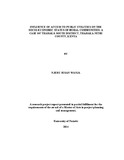| dc.description.abstract | The purpose of this study was to investigate the extent to which access to Public
Service facilities has influenced the socio-economic status of rural residents of
Tharaka South District in Kenya. The specific objectives pursued in this study were
to establish the influence of access to; health facilities, education facilities, water
services, electricity and transport infrastructure on socio-economic status of rural
residents in Tharaka South District. This study used a cross sectional survey design.
The population for this study was all the residents of Tharaka South district. This
study used stratified sampling and simple random sampling. The respondents were
grouped into three strata of rural residents, peri-urban and urban residents. Within
each stratum, simple random sampling was used to identify the individual
respondents. The aim of this study was to reach out to 300 respondents with 100 for
each stratum. The instruments which were used in this research are observation,
interviews and questionnaires. Descriptive statistical methods were employed to
analyze the data, particularly by deriving the minimum, maximum, median, mean
and mode of the study. Additional statistical analyses were performed; including
analysis of the inferential statistics and significance test on the independent variables
to explain the significant difference in the variables. All these tests were done by
using SPSS (statistical package for social science). The study findings revealed
access to health facilities, education facilities. Electricity, water services and
transport infrastructure were key determinant factors of socio-economic status. This
was demonstrated by the mean score of responses and also the regression coefficient.
The study findings showed that the residents value water as an ingredient of their
socio economic growth. The findings indicated that there was a positive and
significant relationship between accessibility to water services and socio economic
status. It was found that transport infrastructure was important to socio economic
status and was statistically significant. It can be concluded that access to education is
an important determinant of resident’s socio economic growth. The study also
concludes that there was need for the Government to ensure more health facilities
were built in the area in order to uplift and improve the resident’s living standards.
This conclusion is notably similar to the efforts and emphasis that the Government is
putting in promoting health care facilities in the country. It can therefore be
concluded that the respondents were happy about the government initiative of
supplying piped water in the area and could carry out different tasks through the use
of that water for example keeping cattle and farming. Electricity is important in
socio-economic growth due to it intrinsic value but many residents have the fear that
its expensive and not affordable but they are adopting slowly to the technological
changes which makes the residents also embrace rural electrification. Transport
infrastructure is a key driver to improved socio-economic status at Tharaka South. It
can therefore be concluded that the poor transport infrastructure has led to
deteriorating socio-economic growth as all the residents’ cannot be able to access all
areas and promote businesses. The study also recommends that more health facilities
should be built to reduce overcrowding in the two hospitals in the whole district. The
county Government should place emphasis on strategies that will ensure better pupil
survival rate at all levels of education. Public benefit organizations should be
encouraged to launch their education programs in the district as a way of
supplementing and complementing Government efforts in education | en_US |

